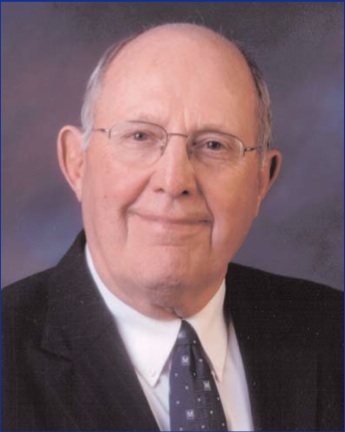2004 Distinguished Lecture Series: Marvin Kay
Marvin L. Kay
Biography
 Marvin L. Kay is Emeritus Professor of Physical Education and Athletics at Colorado School of Mines. Kay retired as the Director of Athletics at Mines in July 2004, a position he had held since 1995.
Marvin L. Kay is Emeritus Professor of Physical Education and Athletics at Colorado School of Mines. Kay retired as the Director of Athletics at Mines in July 2004, a position he had held since 1995.
Professor Kay began his longtime commitment to CSM as an undergraduate student. He was the president of his junior and senior class and the president of his fraternity, Sigma Phi Epsilon. An outstanding athlete, Kay was named the Outstanding Sophomore and Junior athlete while participating on the wrestling and football teams, and named a Small College Football All-American. After earning his Engineer of Mines degree in 1963, Kay signed as a free agent with the Denver Broncos.
In the fall of 1963 Kay joined the Ingersoll Rand Company with the rock drill sales office in New York City. Between the spring of 1964 and summer of 1966 Kay completed a two-year tour of duty with the Army Engineer Corps serving in Germany as a 1st Lt.
Professor Kay returned to his alma mater in the fall of 1966 to serve as the head freshman football coach and swimming coach. The following year he was named the defensive coordinator of the varsity team and in 1969 was appointed the head football coach. In 1980 he was named assistant athletic director and in 1995 was named the director of athletics.
Kay served as the Oredigger head football coach until 1995 and is the all-time winningest coach in school history with 84 wins. In addition, Kay was named the Rocky Mountain Athletic Conference Coach of the Year and the American Football Coaches Association District Coach of the year in 1975 and 1979, and also the National Association of Intercollegiate Athletics District Coach of the Year in 1975. Kay coached 13 All-Americans and 50 All-Conference players during his tenure as coach.
Kay was also inducted into the Eastern Rockies Rugby Union Hall of Fame, received the Joe Kearney service award from the Colorado Football Foundation and Hall of Fame and a special citation of excellence from the Colorado Sports Hall of Fame.
In addition, Professor Kay has served the city of Golden with distinction. He was the Mayor from 1988 to 1996 and was a member of the Golden City Council from 1986 to 1998. He has served as president of the Golden Chamber of Commerce and president of the Golden Civic Foundation, as well as chairman of the Golden Buffalo Bills Day Celebration and chairman of the Golden Oktoberfest Celebration committee. Twice the Golden Chamber of Commerce named Professor Kay “Outstanding Citizen.” In 2002 the CSM Alumni Association named Kay “Outstanding Alumnus”.
In December 2003 Kay was awarded the prestigious Mines Medal by the Colorado School of Mines.
Abstract
Athletics have thrived throughout the history of Colorado School of Mines. In fact, athletics have helped shape, define, and color the School’s rich history. So this year’s lecture will reflect on the value of the various athletic programs to the mission of the institution. It will examine not only intercollegiate programs, but also offerings in required physical education, as well as intramurals, club sports, and outdoor recreation.
The lecture will present a short historical account of the emergence of various programs and their contributions to the overall development of the Mines Graduate, as outlined in the Future Graduate Profile. It will also examine the programs’ responsibilities according to the School’s Strategic Plan for the decade ahead.
Athletics, the lecture will note, strongly complement Mines’ academic mission, enhancing the excellent education that each graduate receives. Foremost in the minds of today’s prospective students are the quality of education and the career opportunities that Mines provides. In addition, many students consider the quality of life outside the classroom-with athletics playing a large, important role-in making their choice of schools. A healthy mind and body are vital to today’s Mines students.
The lecture will emphasize that the importance of striving for excellence in athletics not only impacts the educational experience of individual students, but also elevates and broadens the reputation of the entire institution.